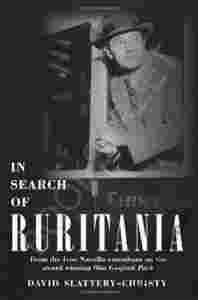|
In Search Of Ruritania By David Slattery-Christy Synopsis This is not a sentimental journey. In Search of Ruritania is an honest and affectionate journey into the life, work and world of the late Ivor Novello. From his first success as a composer with the First World War hit Keep The Home Fires Burning, he went on to become a film star, successful playwright and the creator of glamorous ruritanian musicals which filled the Theatre Royal, Drury Lane. Ruritania was the mythical land in which he set these romantic musicals, it was a land of his own invention and also one which reflected the historical and social events in the real world around him. Within the book his association with the likes of Sir Edward Marsh, who offered him support using his "murder money", and introduced him to Winston Churchill, are explored. Both went on to enjoy a life-long friendship with Novello. Interwoven through the story are accounts of my experiences whilst involved with Novello's works. From the tribute concerts at the Theatre Royal, Drury Lane, to the role I undertook on the award winning film Gosford Park as the Novello Consultant . Along the way I have met and interviewed the likes of Mary Ellis, who starred in Glamorous Night in 1935; Douglas Fairbanks Jnr, who often stayed at Novello's country home with his wife Joan Crawford; Gordon Duttson, Novello's last secretary and lover; Nicholas Hassall, whose father, Christopher Hassall, was Novello's lyricist and close friend. It could stand alone as a story in its own right and doesn't shy away from exploring Novello's homosexuality and his hedonistic, and often bizarre, lifestyle during the 1920s and 30s, and his prison sentence during the Second World War. He could be selfish, petulant and childish but also extraordinarily kind, charming and generous. These elements are a vital part of his story , as much as understanding what was happening in the world around him. Putting Novello in context with world events and social conditions is vital to understanding what influenced him, and how these conditions provided the fertile ground on which he built his celebrity. His sudden death in 1951, aged 58, was front page news. His funeral route was lined by thousands of fans. His circle of friends closed ranks to protect his memory. In fact what they achieved was destructive. Within ten years of his death he was all but forgotten, as if he had never existed.
|

